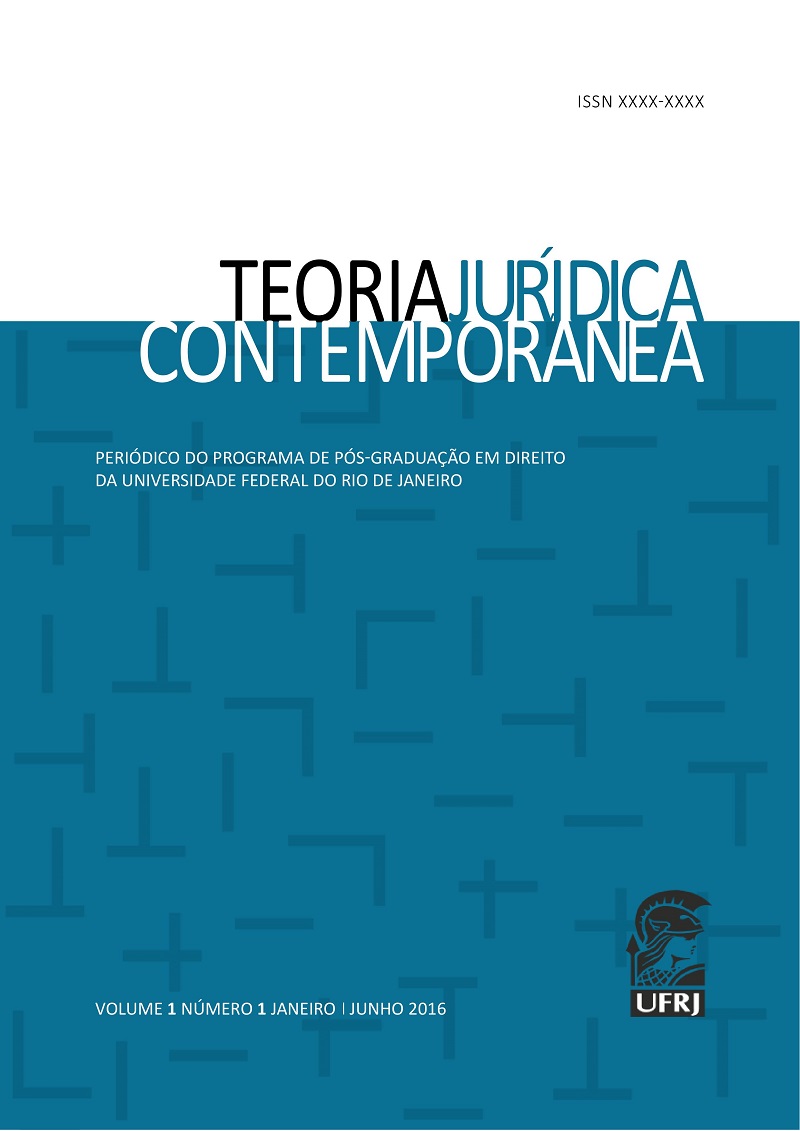El derecho como punto de partida al concepto filosófico de "presunción": la contribución de Ullmann-Margalit
DOI:
https://doi.org/10.21875/tjc.v1i1.3256Keywords:
Presunciones, Razonamiento práctico, Ullmann-Margalit, Presumptions, Practical ReasoningAbstract
Resumen: El presente paper analiza la contribución de Edna Ullmann-Margalit al desarrollo del concepto filosófico de presunción (asumir desde la ocurrencia de un hecho conocido la ocurrencia de un hecho no conocido a modo de actuar sobre él). Ullman-Margalit toma el contexto jurídico como punto de partida de su teoría porque, según ella, el lenguaje técnico del derecho dispone de más precisión que el lenguaje ordinario en lo que respeta a la “presunción” y sus parientes terminológicos. Dado que su paper de 1983 se haya convertido en una referencia a todos los que se dedican a qué significa “presumir”, aquí se ofrecerán dos objeciones a la contribución de Ullmann-Margalit.
Abstract: The present paper analyzes Edna Ullman-Margalit's contribution for the development of a philosophical concept of presumption (assume from the occurrence of a known fact the occurrence of an unknown fact in order to act on its basis). Ullman-Margalit takes the legal context as a departure point for her theory because she believes that technical legal language is more precise than ordinary language in relation to the concept of "presumption" and its terminological cousins. Given that her 1983 paper has been a reference to those who attempt to understand what it means to "presume", this paper will offer two objections to Ullman-Margalit's contribution.
Downloads
References
AGUILÓ REGLA, Joseph. Nota sobre “Presunciones” de Daniel Mendonca. Doxa, vol. 22, p. 649-660, 1999.
AGUILÓ REGLA, Joseph. Presunciones, verdad y normas procesales. Isegoría vol. 35, p. 9-31, 2006.
ALLEN, Ronald J. Presumptions in Civil Actions Reconsidered. Iowa Law Review vol. 843, p. 843-867, 1981.
ALLEN, Ronald J. Presumptions, Inferences and Burden of Proof in Federal Civil Actions - An Anatomy of Unnecessary Ambiguity and a Proposal for Reform. Northwestern University Law Review, vol. 76, no. 6, p. 892-912, 1982.
FERNÁNDEZ LÓPEZ, Mercedes. La carga de la prueba en la práctica judicial civil. Madrid: La Ley, 2006.
FERRER BELTRÁN, Jordi. Una concepción minimalista y garantista de la presunción de inocencia. In: Martí Marmol, Josep Lluís; Moreso, Josep-Joan (Orgs.). Contribuciones a la filosofía del derecho. Madrid: Marcial Pons, 2012.
GAMA, Raymundo. Las presunciones en el derecho y la argumentación. Tesis doctoral. Alicante, 2011.
GAMA, Raymundo. Concepciones y tipología de las presunciones en el derecho continental. Revista de Estudios de la Justicia, vol. 19, p. 65-89, 2013.
GASCÓN ABELLÁN, Marina. Los hechos en el derecho: bases argumentales de la prueba. Madrid: Marcial Pons, 2004.
MENDONCA, Daniel. Presunciones. Doxa, vol. 21, no. I, p. 83-98, 1998.
RESCHER, Nicholas. Dialetics: A Controversy-Oriented Approach to the Theory of Knowledge. New York: State University of New York Press, 1977.
RESCHER, Nicholas. Presumption and the Practices of Tentative Cognition. New York: Cambridge University Press, 2006.
TARUFFO, Michele. Presunzioni (Diritto Processuale Civile). Enciclopedia Giuridica Teccom, vol. XXIV, p. 1-5, 1991.
THAYER, James Bradley. Presumptions and the Law of Evidence. Harvard Law Review, vol. III, no. 4, p. 141-166, 188.
ULLMANN-MARGALIT, Edna. On presumption. The Journal of Philosophy, vol. 30, p. 143-163, 1983.
ULLMANN-MARGALIT, Edna. Holding true and holding as true. Synthese, vol. 92, p. 167-187, 1992.
Downloads
Published
Issue
Section
License
The authors who publish in this journal agree with the following terms:
1. The authors maintain the copyright and grant the journal the right of first publication, with the work simultaneously licensed under the Creative Commons Attribution License that allows the sharing of the work with recognition of authorship and initial publication in this journal.
2. Authors are allowed to assume additional contracts separately, for non-exclusive distribution of the version of the work published in this journal (e.g., publishing in an institutional repository or as a book chapter), with acknowledgment of authorship and initial publication in this journal.
3. Authors are allowed and encouraged to publish and distribute their work online (e.g., in institutional repositories or as a personal page) at any point before or during the editorial process, as this may generate productive changes, as well as increase the impact and citation of the published work (See The Effect of Open Access).

This work is licensed under a Creative Commons Attribution-ShareAlike 3.0 Brazil License.

